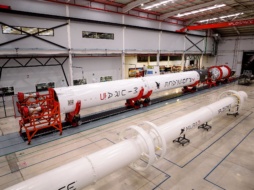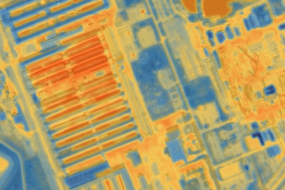PARIS—Ground systems have long been an afterthought of the satellite community, but at World Space Business Week, they took their rightful place as the foundation upon which all the other improvements in satellite capabilities will stand.
Ground stations and ground systems have been making their own improvements alongside the advancements being made in low-latency communications, real-time EO data capabilities, and space-based missile defense architectures.
The ability to quickly get data back to the ground has been a central focus of satellite operators, so all of the sudden, people are paying a lot more attention to the infrastructure that’s being developed here on Earth.
Get smart: On day one of the conference, a group of leaders in the ground systems business sat on a panel to discuss how they’ve made their systems smarter. These leaders highlighted the ways in which their ground systems have been rejigged to become more software-defined—all in an effort to get satellite data into the hands of operators faster.
Finally, the market is catching on.
“Suddenly the ground systems are the cool kids,” said Peter Waskowic, VP of satcom products for Calian, which manufactures hardware for ground stations. “We’re getting some really smart software defined satellites with huge capabilities, so no longer can you manage a satellite like that with a very simple ground system.”
Elsewhere in Paris, leaders spoke about how the growing militarization of space has further ramped up the focus on improving ground infrastructure to deliver satellite data to the hands of warfighters as fast as possible.
“We’re seeing in some areas almost an insatiable demand for some of the capacity that’s coming online,” said Phil Carrai, president of space, training, and cyber at Kratos Defense and Security Solutions. “When you talk about different phenomenologies, being able to be integrated on the ground quickly, whether it is for an intelligence mission or from a missile warning track perspective…Timing is very key.”
Young guns: New companies are popping up to take advantage of the increasing focus on satellite ground systems.
On a panel yesterday, between decades-old ground station companies—KSAT, Viasat, and the Swedish Space Corporation (SSC)—leaders spoke about how the rise in competition is ultimately driving innovation.
“There are more players entering the market. That of course means we have to stay competitive, we have to be innovative, [and] we have to find new ways to also attack costs,” said Nick Priborsky, president at the SSC.
One of those new companies, French ground-station-as-a-service startup Skynopy, which recently partnered with Eutelsat to explore opening up OneWeb ground stations to EO data, told Payload that the ground segment is ripe for disruption.
“The LEO market is realizing that the ground segment needs to be planned ahead of a space program,” Skynopy CEO Pierre Bertrand told Payload via email. “All of the players in the market (especially Earth Observation constellations, but not only) are realizing their needs for a fully managed ground segment—boosting data rate between their satellites and the ground station.”
Whatever the future holds for satellite operators, it’s safe to assume that the ground segment will be a lock step in making advancements of their own to ensure the pace of innovation in orbit is realized to its full potential.




